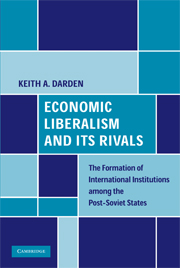 Economic Liberalism and Its Rivals
Economic Liberalism and Its Rivals Book contents
- Frontmatter
- Contents
- List of Figures and Tables
- Acknowledgments
- PART ONE THEORY AND METHODOLOGY
- 1 A Natural Experiment
- 2 A Theory of International Order
- 3 Three International Trajectories
- 4 Liberalism and Its Rivals: History, Typology, and Measurement
- PART TWO CONTINGENT SELECTION AND SYSTEMATIC EFFECTS: COUNTRY-LEVEL ANALYSES OF ELITE SELECTION, IDEATIONAL CHANGE, AND INSTITUTIONAL CHOICE, 1991–2000
- PART THREE COMPARING CASES
- Appendix A Measurement and Coding of Economic Ideas – Additional Tests
- Appendix B Interviews Conducted by the Author
- Bibliography
- Index
2 - A Theory of International Order
Published online by Cambridge University Press: 29 July 2009
- Frontmatter
- Contents
- List of Figures and Tables
- Acknowledgments
- PART ONE THEORY AND METHODOLOGY
- 1 A Natural Experiment
- 2 A Theory of International Order
- 3 Three International Trajectories
- 4 Liberalism and Its Rivals: History, Typology, and Measurement
- PART TWO CONTINGENT SELECTION AND SYSTEMATIC EFFECTS: COUNTRY-LEVEL ANALYSES OF ELITE SELECTION, IDEATIONAL CHANGE, AND INSTITUTIONAL CHOICE, 1991–2000
- PART THREE COMPARING CASES
- Appendix A Measurement and Coding of Economic Ideas – Additional Tests
- Appendix B Interviews Conducted by the Author
- Bibliography
- Index
Summary
As discussed in the previous chapter, the primary empirical finding of this book is that a country's choice to pursue membership in the World Trade Organization, to focus primarily on regional trade institutions, or to take an autarkic path stems from the economic ideas of those who govern it. Why should we expect this to be the case? To what extent should the relationship between ideas and institutional choice hold more generally? To answer these questions, this chapter lays out a broader theoretical case for the relationships among ideas about causation, government choice, and international order. Applying this framework to the question of international economic order, I suggest that changes in international economic order, such as the rise of free trade at the end of the nineteenth century, the move toward autarky in the interwar period in Europe, the rapid increase in the liberalization of trade at the end of the twentieth century, or the creation of regional institutions in Europe and the post-Soviet states, are the aggregation of choices by individual governments, taken relatively independently of the decisions of other states, and based on their economic ideas.
The critiques of this position from liberal and realist theories are to be expected and are dealt with later in the book (Chapter 9). But in principle, one would expect that this argument could find easy theoretical grounding in constructivism, the large and growing branch of International Relations (IR) theory that privileges ideas in its explanation of international order.
- Type
- Chapter
- Information
- Economic Liberalism and Its RivalsThe Formation of International Institutions among the Post-Soviet States, pp. 23 - 50Publisher: Cambridge University PressPrint publication year: 2009


